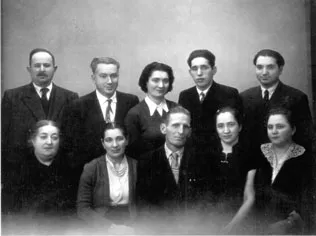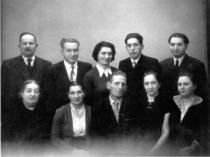This is a picture of my family. From left to right, lower row: the wife of my father's brother Yankel, my older sister Haya, Yankel, my younger sister Sheiva and my wife Dora. Upper row: a distant relative, Haya's husband, Yankel's daughter and son and I, Boris Slobodianskiy. The photo was taken in Chernovtsy in 1961 when Haya was visiting us.
My mother took my sister Sheiva from the children’s home after the war and returned home with her. Our new house in the village was robbed and disassembled to bricks stolen by villagers. Our relatives helped my mother and Sheiva to move to Chernovtsy. My mother went to work at the human resource department at a plant.
After demobilization I came to my mother and sister in Chernovtsy. I liked the town. I went to work as personnel inspector at the textile plant where my mother was working. Later this plant was modified into a garment factory. I worked there until retirement. I was a former military and a party member and I was employed without any problems.
I went to complete my secondary education at an evening school. I finished higher secondary school and entered the faculty of economy at the university where I studied by correspondence. Upon graduation from the university I became production manager.
Throughout this time we had no information about Haya. My mother continuously wrote letters to evacuation agencies, but Haya wasn’t registered in any of them. We believed our sister to be dead, but our mother said she was sure that Haya was alive. My mother died in 1958, some time before we heard from Haya.
It turned out that Haya was captured by Germans at the beginning of the war. She said she was Ukrainian and they let her go. She came to Poyany after we had left. Our neighbors, a Romanian family, took her to Romania as a niece of theirs. She lived all these years with a different name in Romania.
She married a German man, born in Romania and resident of Romania. He knew that Haya was Jewish, but it was no problem for him. They had two sons. In the 1950s my sister and her family moved to Germany. My sister didn’t face any anti-Semitism living in Germany after the Great Patriotic War. Her husband died there and my sister and her sons still reside in Düsseldorf. Her sons are electronic engineers.
My younger sister Sheiva lives in Chernovtsy. After the war she finished Business College and worked as an accountant at a plant. She married a Jewish man, a former inmate of a ghetto. Her husband was foreman at a textile factory.
They had twins: a boy and a girl. They are 45 now. Their son moved to America over ten years ago and their daughter lives with her parents. She is single. She lost her job recently due to major reduction of staff. My sister Sheiva had an infarction. She is 72 and her husband is the same age.
In 1952 I met my wife-to-be Dora Melman. She was born in the Romanian town of Faleshty in 1930. Her father, Wolf Melman, was a leather specialist and her mother, Golda Melman, nee Shnaiderman, was a housewife. My wife’s parents were religious people. They observed all Jewish traditions.
After World War II they moved to Chernovtsy. Dora graduated from the Faculty of Biology of the University and worked as a teacher of Biology at a school in Chernovsty. Her distant relative was my colleague and he introduced me to her.
We got married in 1952. We didn’t have a wedding party. We had a civil ceremony and our parents organized a small dinner to celebrate. We invited our closest relatives to the dinner party.
Boris Slobodianskiy’s family
The Centropa Collection at USHMM
The Centropa archive has been acquired by the United States Holocaust Memorial Museum in Washington, DC.
USHMM will soon offer a Special Collections page for Centropa.
Academics please note: USHMM can provide you with original language word-for-word transcripts and high resolution photographs. All publications should be credited: "From the Centropa Collection at the United States Memorial Museum in Washington, DC". Please contact collection [at] centropa.org.






